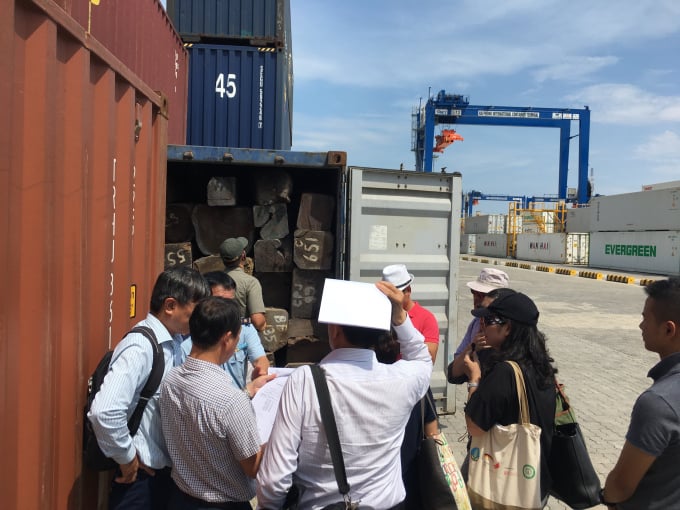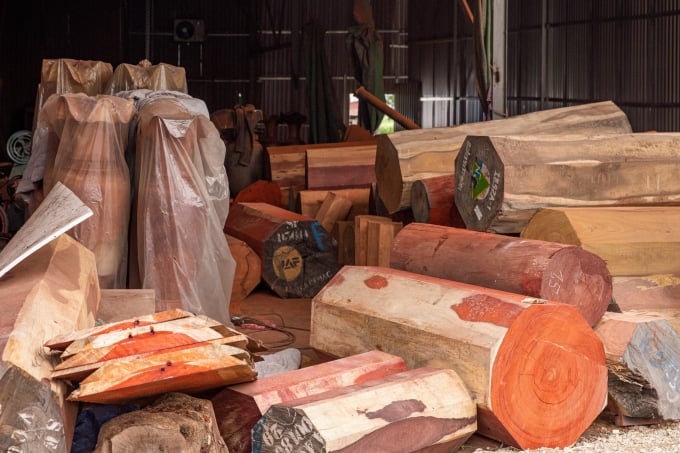November 25, 2025 | 10:17 GMT +7
November 25, 2025 | 10:17 GMT +7
Hotline: 0913.378.918
November 25, 2025 | 10:17 GMT +7
Hotline: 0913.378.918

Accountability is one of the measures to help the timber industry ensuringlegitimacy throughout the supply chain. Photo: TL.
With the aim to help the forestry sector guaranteeing the legitimacy throughout the supply chain, two prestige organizations GIZ and Preferred by Nature put forward the online course on Accountability in timber import.
The course has been officially opened on September 16, with the participation of hundreds of members from many agencies nationwide, such as rangers, customs, businesses, etc.
In the opening remarks of the online course, Mrs. Anja Barth, Chief Advisor, Coordinator of the project Support for the Implementation of the VPA/FLEGT Agreement in Vietnam, said that the requirement for accountability and legality of timber is not only related to the legal timber assurance system in Vietnam and the implementation of the VPA Agreement. These requirements are also directly related to many export markets of wood products that Vietnam is targeting, such as Europe, the US, and Japan.
Vietnam’s timber industry is rich in potential, but it is facing many difficulties and challenges, especially in timber materials supply sources. Vietnam is importing timber materials from over 100 nations every year.
There is another problem that is the explanation to prove the legality of imported timber. The government has stepped up the review of this issue, reflected in the Voluntary Partnership Agreement on Forest Law Enforcement, Governance and Trade (VPA/FLEGT) signed with the EU in 2019. In addition, the government also promulgates the Decree 102/2020-NĐ-CP on the Timber Legality Assurance System (VNTLAS).
The core of the VPA describes Vietnam’s timber legality assurance system (VNTLAS), which will ensure that timber products are verified legal according to specified requirements for all stages of the supply chain, from the forest or the point of import to the point of final sale or export.
Mr. Ngo Sy Hoai, Vice President and General Secretary of the Vietnam Timber and Forest Products Association (VIFOREST) shared his opinions: Individuals and businesses in Vietnam have been accountable for many years, but most are done by experience, spontaneously, not according to a standard system. "This is the survival story of businesses," he emphasized.
According to Mr. Hoai, the online course on accountability in timber import will help governing agencies and businesses understanding thoroughly of principles and better practices of accountability, in order to ensure timber in the supply chain is legal.
Within the framework of the Project Support for VPA Implementation in Vietnam conducted by the Vietnam Administration of Forestry and the German Development Cooperation Organization GIZ, the online course on accountability for imported timber is built on the best practices and experiences drawn from courses on management of supply chain of timber for forest rangers, customs and businesses organized by GIZ in collaboration with the Department of Rangers and VIFOREST in 2020 and 2021.
Currently, the course is open to a wide range of participants via the online platform, including governing agencies, timber businesses and associations, NGOs, and interested people.

Mr. Ngo Sy Hoai, Vice President and General Secretary of the Vietnam Timber and Forest Products Association said that Vietnam imports about 12-13 million m3 of timber annually. Photo: TL.
The training course is completely free. The time to complete the entire course is about 5 and a half hours. After completing and correctly answering at least 60% of the questions of the practical exercise, students will receive a Certificate of “Online Training Course on Accountability in Importing Timber in Vietnam”.
Responding to the Vietnam Agriculture Newspaper (VAN), Ms. Anja Barth said that the implementation of accountability for timber comes from customers' requests. This has gradually become mandatory in many international markets such as the US with the Lacey Act, Japan with the Clean Wood Act, Australia with theIllegal Logging Prohibition Act, and the European Union Timber Regulations (EUTR), ect.
Implementing accountability systematically brings surplus value to timberbusinesses, and is a competitive advantage in the international market. If applied on a large scale, accountability contributes to enhancing the reputation and good image of Vietnam's timber industry.
In the 4.0 technology era, promoting digital transformation to process online documents is an inevitable trend and has been applied in many developed countries. In order for timber accountability to be fully implemented online, we need a system of policies, regulations, detailed guidelines and synchronous enforcement among governing agencies, businesses along with modern infrastructure.
Currently, the Vietnam Administration of Forestry is building an electronic enterprise classification information system (ECIS) to quickly enforce and monitorthe implementation of Decree 102 and the VPA.
For register the online free course on Accountability in timber import, you can access the website https://traininghub.preferredbynature.org/courses.
Translated by Khanh Linh

(VAN) The Ministry of Agriculture and Environment must spearhead the construction of green governance, spanning decision-making processes and investment standards to policy evaluation mechanisms.

(VAN) The Agriculture and Environment sector of Khanh Hoa has achieved numerous milestones over the past 80 years, contributing significantly to the goal of establishing the province as a centrally governed city by 2030.

(VAN) Viet Nam is entering the pivotal period of 2025-2030, moving toward the formulation of the Remote Sensing Law, which will establish a legal foundation for the development of national digital data.

(VAN) The agricultural sector is finalizing the strategic framework for emission reduction, setting the goal of sharply cutting methane and 403.7 million tons of CO2 equivalent and moving toward Net Zero by 2050.
/2025/11/22/2236-1-153832_483.jpg)
(VAN) The National Marine Spatial Planning is opening up opportunities for sustainable blue sea development across 21 coastal localities.

(VAN) Viet Nam’s forestry sector is undergoing a comprehensive transformation, strengthening management, protection, and development efforts to maintain ecological security and drive green, sustainable growth.

(VAN) Viet Nam is accelerating efforts to digitize reservoir operations, from real-time data to hydraulic modelling.